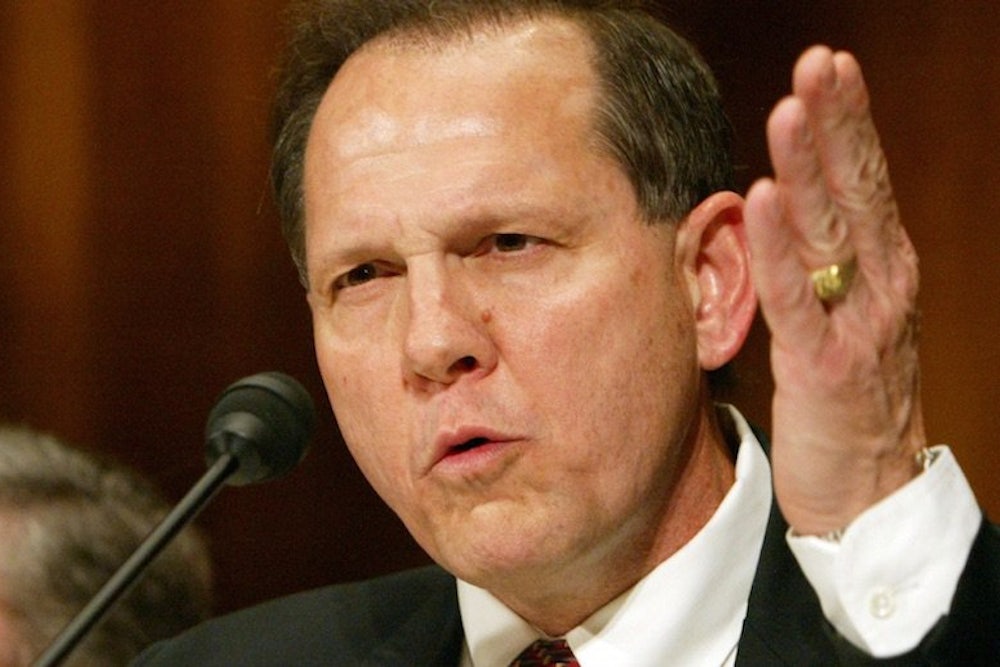Roy Moore, the chief justice of the Alabama Supreme Court and a two-time gubernatorial also-ran, was famously removed from his post in 2003 after refusing to obey a court order to remove a statue of the Ten Commandments that, a federal judge found, violated the Constitution. He won back his chief justice post in a 2012 election, having insisted in an editorial that the U.S. Supreme Court was clear on the issue that “religious liberty is given by God” and the Alabama constitution “invokes ‘the favor and guidance of Almighty God’ in our effort to ‘establish justice.’” Now, Moore is again defying a federal judge’s order, this time in the context of same-sex marriage.
In January, U.S. District Judge Callie Granade, a George W. Bush appointee, declared Alabama’s ban on same-sex marriage unconstitutional, and Moore responded with a letter to Governor Robert Bentley that warned of “serious, legitimate concerns about the propriety of federal court jurisdiction” over Alabama laws. He called the wave of federal-court rulings on gay marriage “tyranny.” Then, on Tuesday, Moore fired off a letter titled “Federal Intrusion into State Sovereignty,” advising probate judges in Alabama not to feel obligated to issue marriage licenses to same-sex couples—and adding, “Marriage has long been recognized as a divine institution ordained by God.” He issued a separate memorandum explaining his legal reasoning, which in essence told fellow state judges that Granade’s “inferior” order only binds the Alabama attorney general, not the courts.
Scholars and commentators are split on whether Moore’s approach has any merit, but the upshot is that Moore won’t accept any pronouncement on same-sex marriage unless it comes from the U.S. Supreme Court itself. And since the Supreme Court is the ultimate arbiter on the Constitution, which trumps Alabama law, Moore simply won’t obey a lowly federal judge’s ruling. Call it judicial ego, or merely the consequences of an elected jurist gone rogue.
Convoluted though this background may be, it sets the stage for why it’s imperative that the Supreme Court—which has taken up a challenge to several states' bans on same-sex marriage—not only rule definitively on the constitutionality of same-sex marriage, but that it do so unequivocally. Every time the issue of equality for gays and lesbians has confronted the court, the justices have moved slowly and tentatively—never as one voice, always sharply divided. And yes, Associate Justice Anthony Kennedy has been the swing vote and author of every one of those landmark decisions—in 1996, 2003, and 2013—but his opinions have been murky at best, inconclusive at worst.
Take Kennedy’s magnum opus, United States v. Windsor, the case invalidating the Defense of Marriage Act. For all his lofty language about dignity, due process, and equal protection of the laws for same-sex couples, Kennedy paid as much respect to the states’ “sovereign authority” in the realm of marriage—their historic prerogative in passing laws governing family matters. It’s the old “federalism” argument against same-sex marriage: that the federal government has no business regulating an institution that is up to the people of a state to define. That argument sounds a lot like Moore's.
Thanks to Kennedy’s assist, at least one federal appeals court bought the argument and used it to deny gay couples in Michigan, Ohio, Kentucky, and Tennessee the opportunity to marry. And now those same couples are before the Supreme Court asking for a clarification and a definitive ruling that will allow them to marry just like everyone else. Now it’s the Court’s turn to speak, and speak loudly, because several states are already ramping up efforts to begin the next front in the culture wars: discrimination against gays and lesbians on religious-freedom grounds.
As of this writing, same-sex marriages in Alabama are set to begin February 9, the deadline Judge Callie set for her order to take effect. Short of Moore standing in the courthouse door or calling on Chuck Norris to help him—or the Supreme Court intervening otherwise—there’s nothing he can do to stop what will eventually be the law of the land.
